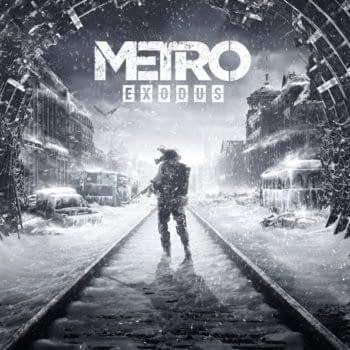Posted in: Games, Video Games | Tagged: entertainment, games, Review, reviews, video games
In Defence Of Review Scores: Why They Can Be A Worthwhile Resource Despite The Hassle
There is a debate had in the video game press community every year or so. It usually spawns from an event or series of that gets everyone who reviews game talking about the merit of review scores. Whether it be a star, number or grading system, controversy follows from time to time, largely due to a rating given. This is almost always for reviews that are more critical of games that some perceive, often before playing, as perfect or untouchable. When a review comes in that departs from the norm, it becomes an internet dog pile on that one review and often the reviewer.
Well, it looks like it's 2016's turn for deliberations, with a series of incidents bringing the question of review scores right to the forefront once again. The most prominent starting place this time around, was IGN's Uncharted 4 review, which provisionally gave the game an 8.8 (it was later raised to 9.0 when multiplayer was accounted for). This caused many commenters to attack reviewer Lucy O'Brien online for having the gall of not giving the game a 10/10. The debate evolved yet again with another IGN review, this time for Stellaris, with Rowan Kaiser giving the game a 6.3/10. This then prompted several fans to go digging into Kaiser's past, digging up an incident where he was annoyed at developer Paradox over an incident at a Con (also ignoring he has a longer, more loving relationship with Paradox), claiming his review was part of a conspiracy to bury Paradox. The developer then jumped in to defend Kaiser, encouraging commenters from attacking the review or score, and placing their faith in his review.
Perhaps the biggest, or at least the most recent, controversy takes us back again to Uncharted 4. Trouble started when The Washington Post posted a review from Michael Thomsen which totally slated the game. Thomsen is well known for having a rather contrarian view on popular game, so keeping in line with his ultra-critical eye, he tore the game asunder. That initial review was not scored, but when it turned up on the lowest rating on Metacritic, with an advised score of 40/100, those who had just gotten over an 8.8 review score on IGN went nuts. However, what sent this particular story into overdrive was acclaimed voice actor Troy Baker, who plays Sam Drake in the game, linked to a petition demanding the review of the game be torn from existence. Baker has gone on to retract the action, but the petition is still going strong with 6.500 signatures.
It's clear that reviews are as controversial as ever, possibly with hype machines bigger than they ever have been. This is certainly some of the press's fault, with those machines only being spun faster by previews and positive opinions to pre-release content, so perhaps it isn't hard to see why it can feel like a betrayal to some readers when a score comes in well under their expectations. Of course, a lot of the fault is also on those readers who actively set out to make life harder for reviewers who aren't unanimously toeing the line on Metacritic. That's stupid, asinine and shows little comprehension of having any idea of what the purpose of a critique is. It also doesn't help that Metacritic can be read without context, with some outlets naturally harsher on games across the board, while also not accounting for reviewers who are known for being especially critical, like Thomsen was.
In many cases, the score at the bottom of a review is the main focus of these grievances, especially if it brings down an entire aggregated average. If a game gets a lower score, it's almost always justified in the text, which some readers don't bother looking at past the numerical value placed at the end. This has caused many reviewers to bemoan the practice of using ratings at all, with some outlets like Kotaku and Eurogamer outright abandoning the model. So with review scores proving to be so controversial, it leaves the question: why bother rating a piece of art in such a way?
You may or may not have noticed that towards the end of last year, especially where video games are concerned, I started putting numerical scores at the end of our game reviews. As I've hopefully illustrated, they can cause a lot of grief, and another argument can easily be had that there is something restrictive to turning art into a math. Art by nature is somewhat indefinable, and thrives without strict borders or judgement. So why do it?
Essentially, because I don't think all of you are idiots, and I know a score can be useful to you. There have been a few discussions around a couple of our reviews, (especially Quantum Break which I gave a 6.8 because it didn't entirely click for me) but for the most part, I have found that engagement is up more on reviews where I do provide a score. For the most part, what I get in the comments, Twitter and other places our reviews reach like N4G and NeoGAF, almost all of the discussions have been pretty positive. So, hey. Have some brownie points on me.
When not causing ludicrous controversies, I genuinely believe a rating helps some readers. I'm not so precious over my words that I think everyone needs to read everything I've put down to paper on a game or a film. I want it to be useful to different readers at all times. While I'll always appreciate someone taking the time out of their day to read what I have to say on something, I know there are those who want to just pop in, maybe read a part of my final paragraph, look at the score and pop out. That is fine too. Perhaps it helps that Bleeding Cool is not featured on Metacritic thus not pulling down that sacred Metacritic total, but for the most part, the inclusion of a score on our reviews have been a nearly entirely positive thing.
On top of that, I just like using them. They keep things tidy, help me reflect on how well a game achieves its goal and stands in the pantheon, thus improving my reviews. I'm not going to change something I enjoy doing because an someone on the internet is disappointed or seething at the mouth over a justified critique. The internet will always have a small pocket of people being mean spirited. They will find a way to do that regardless of a number at the end of my writing.
None of this is to cheapen the harassment that some of my peers receive for having the gall of being asked to express their opinion on a video game. Lets get real. If you are mad someone gave a game .2 less than you would have liked on a review score, then you need to get a grip. Getting mountains of abuse for it is draining, with a real world affect on people. Cut that out. Also, silencing criticism is just a bad idea, it never works and you almost never end up looking good.
However, review scores still have use, a practical use for those with busy lives who want a quick assessment of something they are considering picking up. It's not a blanket use for all outlets, and everyone has to arrive at their own style, again providing you guys with a choice of who you identify with. Yes, review scores can be used to throw immature hissyfits, but that doesn't mean they are bad, or should be completely avoided. They are just another tool in a reviewer's box, and it seems silly to lament their use, which many appreciate, because some people who've gotten a little too carried away care a little too much about a game's perception and Metacritic score. Now, if we were to talk about the negativity based on review score aggregation, that is a whole other kettle of fish, but one for another day.















